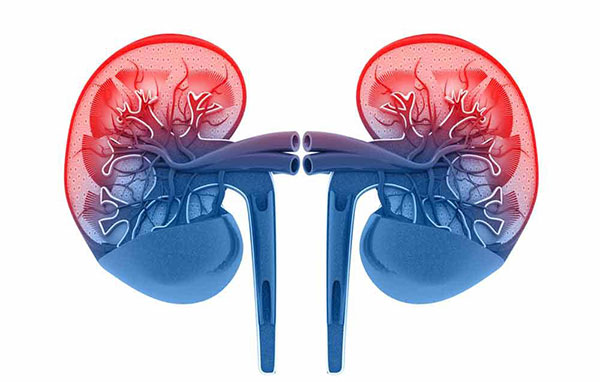What is Acute Kidney Failure?
Your kidneys, like every other organ in your body, have multiple jobs. They’re deeply connected to the rest of your body. Their main function is to filter waste out of your blood. They also remove extra fluid from your blood (this becomes urine) and control blood pressure. Kidneys help make red blood cells. They regulate electrolytes (a type of nutrient) and activate vitamin D, too.
When your kidneys are damaged, they stop working like they should. This could happen because of another health condition, like diabetes. A decrease in kidney function that happens over time is called chronic kidney failure.
When your kidneys stop working suddenly, you have what doctors call acute kidney failure (or acute renal failure). It can happen over just a few hours or days.
Acute kidney failure isn’t always permanent. If you get treatment right away — and if you don’t have other serious health problems — your kidneys may go back to working like normal.
Symptoms of Acute Kidney Failure
Sometimes, there aren’t any. Your doctor may discover you have this condition while doing lab tests for another reason.
If you do have symptoms, they’ll depend on how bad your loss of kidney function is, how quickly you lose kidney function, and the reasons for your kidney failure. You may experience the following:
 Itching
Itching
Causes of Acute Kidney Failure
There are three main reasons your kidneys fail all of a sudden:
1. Something is stopping blood flow to your kidneys. It could be because of:
- An infection
- Liver failure
- Medications (aspirin, ibuprofen, naproxen, or COX-2 inhibitors, like Celebrex)
- Blood pressure medications
- Heart failure
- Severe burns or dehydration
- Blood or fluid loss
2. You have a condition that’s blocking urine from leaving your kidneys. This could mean:
Bladder, cervical, colon or prostate cancer
Blood clots in your urinary tract
An enlarged prostate
Kidney stones
Nerve damage in your bladder
Medications that can directly damage kidneys, including NSAIDS, chemotherapy, and antibiotics
3. Something has directly damaged your kidneys, like:
- Blood clots
- Cholesterol deposits
- Glomerulonephritis (inflamed kidney filters; can be caused by an infection, autoimmune disease (like lupus), multiple myeloma, scleroderma, chemotherapy drugs, antibiotics, or other toxins)
Am I at Risk for Acute Kidney Failure?
Most of the time, kidney failure happens along with another medical condition or event. If you fall into any of the following categories, you may have a greater chance of acute kidney failure:
- You’ve been hospitalized for a long time, especially in intensive care.
- You have diabetes.
- You’re elderly.
- Blood vessels in your arms and legs are blocked.
- You have heart failure or high blood pressure.
- You have chronic kidney or liver disease.
How do Doctors Diagnose Kidney Failure?
Your doctor will start with a physical exam. Then, he’ll order tests of your blood, urine, and kidneys.
Blood tests. These measure two substances in your blood — creatinine and urea nitrogen.
- Creatinine is a waste product in your blood that’s produced by muscle activity. Normally, it’s removed from your blood by your kidneys. But if those organs stop working, your creatinine level rises.
- Urea nitrogen is another waste product in your blood. It’s created when protein from the foods you eat is broken down. Like creatinine, your kidneys remove this from your blood. When your kidneys stop working, your urea nitrogen levels rise.
Urine tests.
Your doctor will check your pee for blood and protein. He’ll also look for certain electrolytes (chemicals that control important body functions). The results help him understand what’s causing your kidney failure.
Imaging tests.
Some tests, like ultrasonography or a CT scan, can show whether your kidneys are enlarged or there’s a blockage in your urine flow. An angiogram can tell your doctor if the arteries or veins that lead to your kidneys are blocked. An MRI can show the same thing.
Kidney Failure Treatment
If there aren’t any other problems, the kidneys may heal themselves.
In most other cases, acute kidney failure can be treated if it’s caught early. It may involve changes to your diet, the use of medications, or even dialysis.
- Diet. Your doctor will limit the amount of salt and potassium you can take in until your kidneys heal. That’s because both of these substances are removed from your body through your kidneys. Changing how and what you eat won’t reverse acute kidney failure. But your doctor may modify your diet while he deals with the conditions that caused it. This may mean treating a health problem like heart failure, taking you off certain medications, or giving you fluids through an IV if you’re dehydrated.
- Drugs. Your doctor may prescribe medicines that regulate the amount of phosphorous and potassium in your blood. When your kidneys fail, they can’t remove these substances from your body. Medications won’t help your kidneys, but they may reduce some of the problems kidney failure causes.
- Dialysis . If you have acute kidney failure, your doctor will most likely recommend hemodialysis. In this procedure, you’re hooked up to a machine that cleans your blood. If the cause of your kidney failure is treated and the organs recover, you may only need hemodialysis for a short time. If not, you’ll need it permanently.

